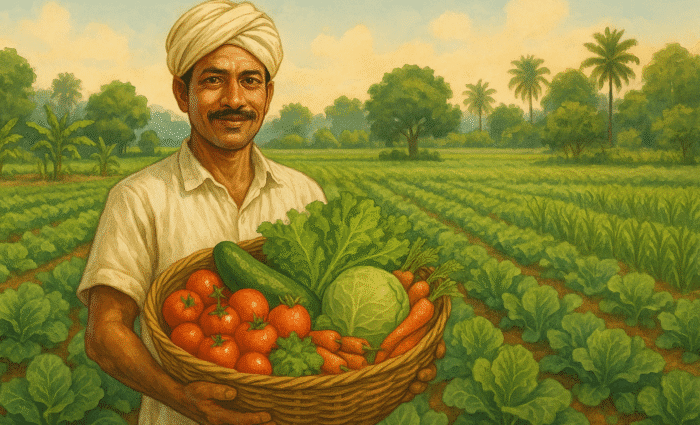Introduction: Why the Clean Food Movement Matters
“Food is medicine”—this age-old saying is now gaining more importance than ever. In India, where agriculture is the backbone of the economy, the way our food is grown affects not only farmers but also the health of millions of families.
Unfortunately, over the last few decades, heavy use of fertilizers, pesticides, and chemicals has increased. While this improved short-term yields, it also led to long-term health risks, soil degradation, and water pollution. Consumers today are unknowingly eating vegetables and fruits that carry toxic residues.
This is where the Clean Food Movement steps in. Across India, farmers are returning to natural methods of farming, producing toxin-free vegetables and fruits that are safe, sustainable, and healthy. The movement is not just about food—it’s about a healthier population, a safer environment, and a fairer system for farmers.
In this blog, let’s explore how farmers in India are growing toxin-free produce, what challenges they face, and why this movement is the future of Indian agriculture.
What is the Clean Food Movement?
The Clean Food Movement is a growing trend in India that focuses on producing and consuming chemical-free, toxin-free food. It is built on three core principles:
Safety for Consumers – Ensuring vegetables and grains are free from harmful pesticide residues.
Sustainability for the Environment – Reducing soil, air, and water pollution caused by chemicals.
Fairness for Farmers – Giving farmers better income by connecting them directly to conscious consumers willing to pay for quality.
This movement is not just about organic farming; it’s about changing the way food reaches our plates, ensuring every step in the supply chain promotes health and sustainability.
Why Farmers are Shifting Towards Toxin-Free Farming
Farmers in India are realizing that chemical-heavy farming is not a long-term solution. Here’s why they are shifting to toxin-free practices:
Soil Health Decline
Overuse of chemical fertilizers has reduced soil fertility, forcing farmers to spend more every year to maintain yields.Water Contamination
Pesticides seep into groundwater, creating long-term health hazards for entire villages.Consumer Awareness
Urban families are now demanding chemical-free vegetables and fruits, creating a profitable market for farmers.Government & NGO Support
Many state governments, along with NGOs, are providing training and support for organic and natural farming.Better Income Opportunities
Farmers growing toxin-free produce often earn 20–40% more than those selling chemically grown crops.
How Indian Farmers Are Growing Toxin-Free Produce
Farmers across India are adopting innovative techniques to grow food without harmful chemicals. Some of the popular practices include:
1. Natural Fertilizers Instead of Chemicals
- Use of cow dung, compost, and bio-fertilizers to improve soil fertility.
- Vermicomposting for nutrient-rich soil.
2. Bio-Pesticides & Natural Pest Control
- Neem oil, garlic spray, and chili extracts are used as natural insect repellents.
- Crop rotation prevents pest build-up.
3. Soil Testing and Balanced Farming
- Regular soil health tests ensure correct nutrient balance.
- Intercropping methods (planting different crops together) reduce dependency on pesticides.
4. Water-Smart Agriculture
- Farmers use drip irrigation and rainwater harvesting to reduce water pollution.
5. Community Supported Agriculture (CSA)
- Farmers directly supply chemical-free vegetables to urban families via local farmer markets or apps like Bharat Farm Connect, eliminating middlemen.
Case Studies: Farmers Leading the Movement
Chhattisgarh – The Push for Organic Paddy
In several districts of Chhattisgarh, farmers have reduced chemical use in paddy farming. Supported by cooperatives, they now sell rice labeled as “toxin-free” at better prices in urban markets.
Odisha – Vegetable Farmers Adopting Natural Sprays
Vegetable farmers in Odisha are experimenting with neem-based sprays, which protect crops while keeping them toxin-free. Their produce now fetches premium rates in Bhubaneswar and Cuttack markets.
Jharkhand – Women Farmers Leading Change
Women-led self-help groups in Jharkhand are growing toxin-free leafy vegetables and selling directly to consumers through weekly farmer markets.
Madhya Pradesh – The Soya Success Story
MP farmers, known for soybean, are slowly shifting to chemical-free soya cultivation, which is in demand from international buyers.
Challenges Farmers Face in Toxin-Free Farming
While the movement is growing, farmers face significant hurdles:
- Higher Labor Costs: Natural farming requires more manual effort.
- Lack of Awareness: Many consumers still buy the cheapest option without checking quality.
- Certification Issues: Organic certification in India is costly and time-consuming.
- Market Access: Farmers often don’t know how to reach urban buyers directly.
This is where digital platforms like Bharat Farm Connect play a crucial role—helping farmers showcase their toxin-free produce, build trust with buyers, and ensure fair prices.
Why Toxin-Free Produce Matters for Consumers
For families in India, especially in cities, toxin-free produce is no longer a luxury—it’s a necessity. Here’s why:
- Reduces health risks like cancer, diabetes, and hormonal imbalances.
- Protects children’s development by avoiding harmful chemicals.
- Improves nutrition, since chemical-free vegetables retain more vitamins and minerals.
- Tastes fresher and better, as no artificial ripening agents are used.
When consumers buy toxin-free food, they are not only protecting their family but also supporting farmers and the planet.
The Role of Bharat Farm Connect in the Clean Food Movement
At Bharat Farm Connect, we are committed to making the Clean Food Movement mainstream. Our mission is to:
Empower farmers to grow toxin-free produce with fair income.
Connect urban consumers directly with verified, chemical-free produce.
- Build transparency and trust through traceability—consumers know exactly which farmer grew their food.
- Promote sustainability, reducing wastage and ensuring a healthier supply chain.
By bridging the gap between farmers and consumers, Bharat Farm Connect ensures that toxin-free food becomes accessible to every Indian household.
The Future of the Clean Food Movement in India
The Clean Food Movement is more than a trend—it’s a revolution in Indian agriculture. Over the next decade:
- More farmers will switch to toxin-free farming due to demand and better income.
- Consumers will prioritize safety and sustainability over low prices.
- Technology will make traceability and transparency standard in food supply chains.
- India has the potential to become a global leader in clean, toxin-free food production.
Conclusion: A Shared Responsibility
The Clean Food Movement is not just about farmers—it’s about all of us. Farmers are ready to grow safe, chemical-free food, but consumers must also support them by choosing toxin-free produce.
Every time you buy clean vegetables, you’re not just feeding your family—you’re fueling a movement that ensures:
- Healthy people
- Happy farmers
- A safe planet
With initiatives like Bharat Farm Connect, the dream of toxin-free India is closer than ever.





